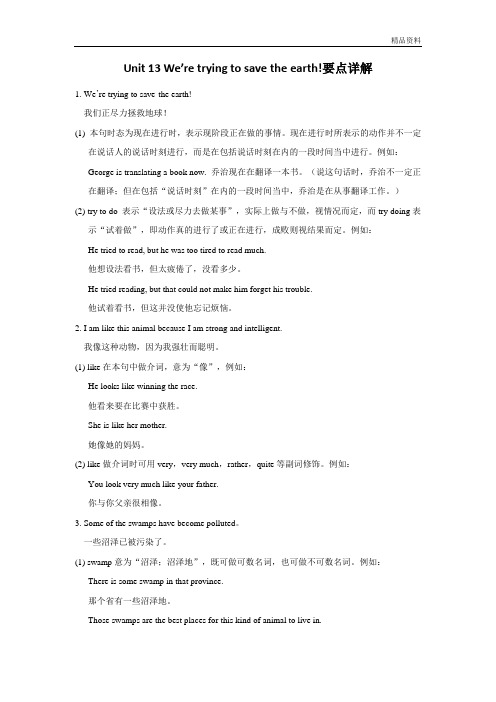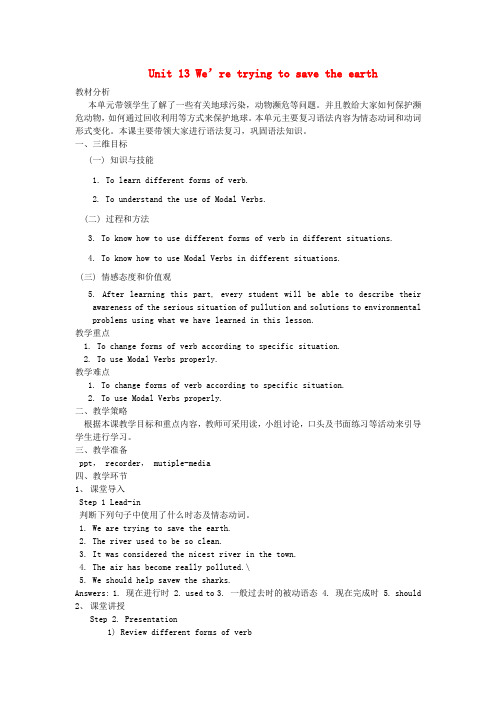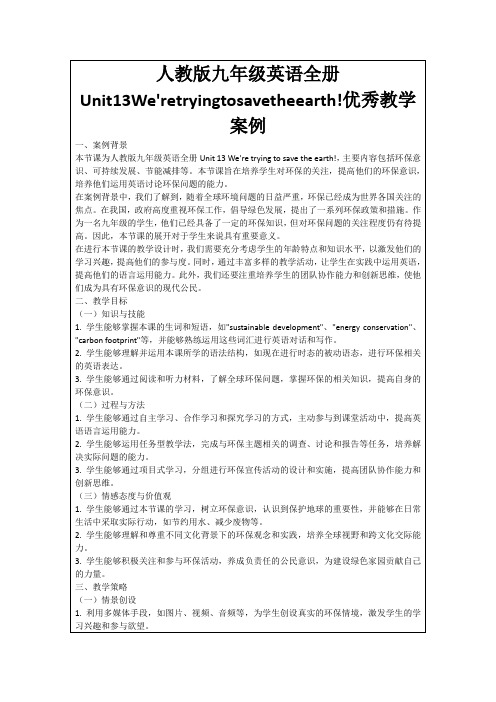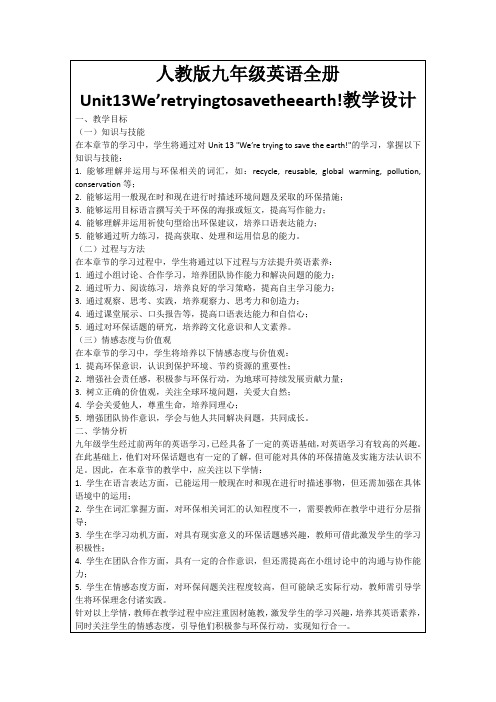人教新目标版九年级英语全册《Unit13We’retryingtosavetheearth》第5课时
新人教版九年级英语下册Unit 13 We’re trying to save the earth!要点详解

Unit 13 We’re trying to save the earth!要点详解1. We’re trying to save the earth!我们正尽力拯救地球!(1) 本句时态为现在进行时,表示现阶段正在做的事情。
现在进行时所表示的动作并不一定在说话人的说话时刻进行,而是在包括说话时刻在内的一段时间当中进行。
例如:George is translating a book now. 乔治现在在翻译一本书。
(说这句话时,乔治不一定正在翻译;但在包括“说话时刻”在内的一段时间当中,乔治是在从事翻译工作。
)(2) try to do 表示“设法或尽力去做某事”,实际上做与不做,视情况而定,而try doing表示“试着做”,即动作真的进行了或正在进行,成败则视结果而定。
例如:He tried to read, but he was too tired to read much.他想设法看书,但太疲倦了,没看多少。
He tried reading, but that could not make him forget his trouble.他试着看书,但这并没使他忘记烦恼。
2. I am like this animal because I am strong and intelligent.我像这种动物,因为我强壮而聪明。
(1) like在本句中做介词,意为“像”,例如:He looks like winning the race.他看来要在比赛中获胜。
She is like her mother.她像她的妈妈。
(2) like做介词时可用very,very much,rather,quite等副词修饰。
例如:You look very much like your father.你与你父亲很相像。
3. Some of the swamps have become polluted。
一些沼泽已被污染了。
九年级英语全册-Unit-13-We’re-trying-to-save-the-earth(第2课时)教案-(新版)人教新目标版

Unit 13 We’re trying to save the earth教材分析本单元带领学生了解了一些有关地球污染,动物濒危等问题。
并且教给大家如何保护濒危动物,如何通过回收利用等方式来保护地球。
本单元主要复习语法内容为情态动词和动词形式变化。
本课主要带领大家进行语法复习,巩固语法知识。
一、三维目标(一) 知识与技能1. To learn different forms of verb.2. To understand the use of Modal Verbs.(二) 过程和方法3. To know how to use different forms of verb in different situations.4. To know how to use Modal Verbs in different situations.(三) 情感态度和价值观5. After learning this part, every student will be able to describe theirawareness of the serious situation of pullution and solutions to environmental problems using what we have learned in this lesson.教学重点1. To change forms of verb according to specific situation.2. To use Modal Verbs properly.教学难点1. To change forms of verb according to specific situation.2. To use Modal Verbs properly.二、教学策略根据本课教学目标和重点内容,教师可采用读,小组讨论,口头及书面练习等活动来引导学生进行学习。
人教版新目标版九年级英语全册Unit 13 We’re trying to save the earth教案

Unit 13 We’re trying to save the earth!知识导航语言目标谈论污染和环境保护。
Section A 重点单词1. litter v.乱扔n.垃圾2. bottom n.底部3. coal n.煤4.ugly adj.丑陋的 5. cost v.花费n.花费 6. wooden adj.木制的 (wood n.木材) 7. plastic adj.塑料的n.塑料 8. method n.方法 9. cruel adj.残酷的 10. harmful adj.有害的 (harm n.害处) 11. industry n.工业 12. law n.法律 13. afford v.承担得起重点短语1.make a difference 起作用;有影响2. take part in 参加3. turnoff 关掉4. pay for 付费;付出代价5. cut down 减少6. lead to 导致7.hear of 听说 8. cut off 切除重点句型1.We’re trying to save the earth. 我们在努力拯救地球。
2. The rive used to be so clean. 这河流过去是如此的清澈。
3. The air is badly polluted. 空气被严重污染。
4. The method is not only cruel, but also harmful to theenvironment. 这种方法不仅残酷,而且对环境也有害。
Section B +Self Check 重点单词1. recycle v.回收利用2. gate n.大门3. bottle n.瓶子4.president n. 负责人 5. work n.作品 6. metal n.金属重点短语1. throw away 扔掉2. put sth. to good use 好好利用3. put …down 拆下 4. upside down 上下颠倒 5. bring back 恢复重点句型1. And the gate in front of her house is made of rocks and oldglass bottles. 她房子的前门是由岩石和旧玻璃瓶子制成的。
人教版九年级英语全册Unit13We'retryingtosavetheearth!优秀教学案例

(三)情感态度与价值观
1.学生能够通过本节课的学习,树立环保意识,认识到保护地球的重要性,并能够在日常生活中采取实际行动,如节约用水、减少废物等。
2.学生能够理解和尊重不同文化背景下的环保观念和实践,培养全球视野和跨文化交际能力。
(四)反思与评价
1.教师引导学进行自我反思,评估自己在环保知识掌握和技能运用方面的进步,培养他们的自我监控和自我调整能力。
2.学生通过互评和小组评价,相互借鉴和学习,提高自己的环保意识和语言运用能力。
3.教师对学生的学习过程和成果进行综合评价,关注他们的全面发展,鼓励他们的创新和实践精神。同时,根据评价结果调整教学策略,提高教学效果。
2.学生通过完成作业,进一步巩固本节课所学内容,提高他们的语言运用能力。
3.教师对学生的作业进行评价,关注他们的全面发展,鼓励他们的创新和实践精神。同时,根据评价结果调整教学策略,提高教学效果。
五、案例亮点
1.创新的情景创设:本节课通过多媒体手段,如图片、视频等,为学生创设了丰富的环保情境,使学生身临其境地感受到环保问题的紧迫性。这种创新的情景创设方式不仅激发了学生的学习兴趣,而且提高了他们的参与度和学习效果。
四、教学内容与过程
(一)导入新课
1.教师通过展示一张地球的照片,引导学生关注地球的美丽和脆弱,引出本节课的主题——环保。
2.教师提问:“你们对环保有什么了解和看法?”让学生分享自己的知识和观点,激发他们的学习兴趣和参与欲望。
3.教师播放一段关于环保问题的新闻报道,让学生了解全球环保形势的严峻性,引出本节课的学习目标——提高环保意识,学习英语表达环保观点。
4.反思与评价的全面评估:教师引导学生进行自我反思,评估自己在环保知识掌握和技能运用方面的进步。同时,教师对学生的学习过程和成果进行综合评价,关注他们的全面发展。这种反思与评价的方式有助于培养学生的自我监控和自我调整能力,提高他们的批判性思维和创造性思维。
人教版英语九年级全册Unit13We'retryingtosavetheearth!优秀教学案例

4.对小组合作进行评价,关注学生的参与度、贡献度和团队合作效果。
(四)反思与评价
1.引导学生进行自我反思,思考自己在学习过程中的优点和不足,培养自我评价和自我改进的能力。
2.组织学生进行同伴评价,鼓励他们互相提供反馈和建议,培养评价能力和批判性思维。
3.创设问题情境,让学生面临真实的环保问题,如水资源浪费、垃圾分类等,引导学生主动思考和寻找解决方案。
4.利用多媒体技术,如视频、音频、动画等,营造生动有趣的学习氛围,激发学生的学习兴趣和积极性。
(二)问题导向
1.设计有挑战性的问题,引导学生深入思考环保问题的本质和影响。
2.通过提问和讨论,引导学生自主探究和解决问题,培养他们的批判性思维和问题境的影响。
3.总结本节课的主要内容和知识点,确保学生对环保知识有一个全面而准确的理解。
(五)作业小结
1.布置相关的作业,如研究报告、行动计划等,让学生将所学知识运用到实际生活中去。
2.要求学生在作业中提出自己的观点和解决方案,培养他们的创新思维和批判性思维能力。
3.引导学生关注环保问题的多样性和复杂性,培养他们的分析和综合能力。
4.鼓励学生提出自己的问题,激发他们的好奇心和探索精神。
(三)小组合作
1.组织学生进行小组讨论和合作,鼓励他们分享自己的观点和想法,培养合作能力和团队精神。
2.设计小组活动,如共同完成一篇关于环保的文章、策划一次环保活动等,让学生实际行动起来,提高实践能力。
3.鼓励学生在作业中积极表达自己的想法,注重培养他们的写作能力和表达能力。
4.对学生的作业进行认真批改和评价,提供及时的反馈和建议,帮助学生巩固所学知识,提高他们的学习效果。
人教版九年级英语全册Unit13We’retryingtosavetheearth!教学设计

(3)海报制作:让学生分组制作环保海报,运用所学词汇和表达方式。
4.课后作业:
(1)要求学生撰写一篇关于环保的短文,巩固写作能力;
(2)鼓励学生参与环保活动,记录自己的行动和感受,提高实践能力。
5.评价与反馈:
(1)教师针对学生在课堂活动中的表现,给予及时、具体的评价;
-播放一段关于环保行动的听力材料,学生听后回答相关问题。
-教师引导学生总结听力材料中的关键信息,帮助学生提高获取、处理和运用信息的能力。
(三)学生小组讨论
1.教师将学生分成小组,每组选择一个环保主题,如:节约用水、减少塑料污染等。
2.小组内讨论以下问题:
- What are the main environmental problems related to your topic?
人教版九年级英语全册Unit13We’retryingtosavetheearth!教学设计
一、教学目标
(一)知识与技能
在本章节的学习中,学生将通过对Unit 13 "We’re trying to save the earth!"的学习,掌握以下知识与技能:
1.能够理解并运用与环保相关的词汇,如:recycle, reusable, global warming, pollution, conservation等;
1.完成课本练习册中与本课相关的练习题,特别是词汇填空、语法填空和听力练习,以加深对环保词汇和语法的掌握。
2.结合课堂所学,制作一份关于环保的海报,内容包括:环保主题、现状介绍、具体措施和建议。要求设计新颖,语言表达清晰,图文并茂。
3.撰写一篇短文,以“我的环保行动”为主题,描述自己在日常生活中实施的环保措施,以及对环保的认识和体会。字数在100-120词左右,要求使用一般现在时和现在进行时描述。
人教版(新目标)英语九年级下册《Unit 13 We're trying to save the earth!》单元话题阅读与写作课件
vegetables
from their own garden.
★ The pupils bring both their books and their
(3)_r_u_b_b_i_s_h_to school.
Recycling ★ The pupil who works hardest at recycling will
(4)_g_e_t_/_r_e_c_ei_v_e__a_p__ri_z_e_from the teachers.
Finding cleaner ★ Fairfield School asks teachers and students not
ways to get to go to school (5)__b_y__c_a_r_.
根据短文内容,完成表格中的有关信息。
Ways How to (1)___p_r_o_t_e_c_t_t_h_e_e_n__v_ir_o_n_m__e_n_t___
★ Pupils at Fairfield School can enjoy delicious
Growing
food by growing and (2)_p__ic_k_i_n_g__vegetables
3. water pollution:___w__a_s_h_in_g__c_lo_t_h_e_s_i_n_t_h_e__ri_v_e_r_, ____ __l_it_t_er_i_n_g_i_n__th_e__r_iv_e_r_, _w_a_s_t_e_w__a_te_r_f_r_o_m__f_a_c_to_r_i_e_s___
_N__o_w__I_w__a_n_t _t_o_t_a_lk__a_b_o_u_t_t_h_e_a_i_r_p_o_l_l_u_ti_o_n_.___________
UNIT13Weretryingtosavetheearth原文与翻译
UNIT13We'retryingtosavetheearth原文与翻译《牛津初中英语》充分体现了《新课标》的诸多精神。
该教材具有两大特点。
下面是小偏整理的UNIT13We'retryingtosavetheearth 原文与翻译,感谢您的每一次阅读。
UNIT13We'retryingtosavetheearth原文与翻译SectionA1bListenandcompletethesentences.Tony:Hey,Mark,maybewecouldgoswimmingintheriverlaterthi safternoon.Mark:Idon’tthinkIwanttogo,Tony.Tony:Whynot?Mark:Iwastherelastweekendandtheriverwasreallydirty.Eventh ebottomoftheriverwasfullofrubbish,andtherewerenomorefishforf ishermentocatch.Tony:Noway!Itusedtobesoclean.Infact,ithasalwaysbeentheni cestriverinthistown.Mark:Notanymore.Ithinkpeoplearethrowinglitterintotheriver. Factoriesarealsoputtingwasteintotheriver.Tony:That’sterrible!Weshouldwritetothegovernment.Theys houldclosedownthefactories.Mark:Goodidea!ButIthinkeveryoneinthistownshouldhelptocl eanuptheriver,too.Everyoneshouldplayapart,notjustthegovernm entSectionA2aListentotheinterview.thekindsofpollutionthatJasonandSusan talkabout.Interviewer:T odaywe’retalkingtoJason andSusanaboutenvir onmentalproblems.JasonandSusan,canyoutellusaboutsomeofth eproblemsyou’veseen?Jason:Ithinkoneproblemisthattheairisbadlypolluted.Ihardlye verseeblueskiesanymore.Susan:Yes,andIusedtoseethestarsclearly.Interviewer:Whatdoyouthinkhascausedthisproblem?Susan:Well,therearemorecarsontheroadthesedays.Jason:Andfactoriesthatburncoalalsopollutetheairwithalotofb lacksmoke.Interviewer:Whatotherproblemsdoyousee?Susan:Iguessthere’stoomuchrubbishandwasteinthestreets.Jason:Yes!Everydaypeoplearethrowingawaythingslikewoode nchopsticks,plasticbowlsandplasticbags.Susan:They’realsolitteringinpublicplaces,forexample,durin gpicnicsinparks.Thisisturningbeautifulplacesintouglyones.Interviewer:You’reright.Theseareseriousproble msforourenv ironment.Next,let’stalkaboutthethingswecandotohelp.SectionA2bListenagainandcompletethesentences.Interviewer:T odaywe’retalkingtoJasonandSusanaboutenvir onmentalproblems.JasonandSusan,canyoutellusaboutsomeofth eproblemsyou’veseen?Jason:Ithinkoneproblemisthattheairisbadlypolluted.Ihardlye verseeblueskiesanymore.Susan:Yes,andIusedtoseethestarsclearly.Interviewer:Whatdoyouthinkhascausedthisproblem?Susan:Well,therearemorecarsontheroadthesedays.Jason:Andfactoriesthatburncoalalsopollutetheairwithalotofb lacksmoke.Interviewer:Whatotherproblemsdoyousee?Susan:Iguessthere’stoomuchrubbishandwasteinthestreets.Jason:Yes!Everydaypeoplearethrowingawaythingslikewoodenchopsticks,plasticbowlsandplasticbags.Susan:They’realsolitteringinpublicplaces,forexample,d urin gpicnicsinparks.Thisisturningbeautifulplacesintouglyones.Interviewer:You’reright.Theseareseriousproblemsforourenv ironment.Next,let’stalkaboutthethingswecandotohelp.SectionA2dRoleplaytheconversation.JasonandSusan,whatareyourideasforsolvingtheseproblems?Well,tocutdownairpollution,weshouldtakethebusorsubwayin steadofdriving.Yeah,orrideabike.Thereareotheradvantagesofbikeriding.It'sg oodforhealthitdoesn'tanythingGreatideas!Whataboutwastepollution?Mmm,Ithinksimplethingslikebringingabagtogoshoppingcan help.Istarteddoingthatayearago.Me,tooAlso,Inevertakewoodenchopsticksorplasticforkswhen Ibuytakeawayfood.Iusetheonesathome.Andremembertothrowrubbishinthebinsandkeeppublicplace scleanandbeautifulforeveryone.Sotogether,ouractionscanmakeadifferenceandleadtoabetter future!SectionA3aReadthepassageaboutsharksandcompletethefactsheetbelow.SavetheSharks!Manyhaveheardofsharkfinsoup.Thisfamousandexpensivedis hisespeciallypopularinsouthernChina.Butdoyourealizethaty ou’r ekillingawholesharkeachtimeyouenjoyabowlofsharkfinsoup?Whenpeoplecatchsharks,theycutofftheirfinsandthrowthesha rkbackintotheocean.Thisisnotonlycruel,butalsoharmfultotheenvir onment.Withoutafin,asharkcannolongerswimandslowlydies.Sharksar eatthetopofthefo odchainintheocean’secosystem.Iftheirnumber sdroptoolow,itwillbringdangertoalloceanlife.Manybelievethatsharkscanneverbeendangeredbecausethey arethestrongestintheirfoodchain.Butinfact,around70millionshark sarecaughtandtradedinthisindustryeveryyear.Thenumbersofsomekindsofsharkshavefallenbyover90percen tinthelast20to30years.Environmentalprotectiongroupsaroundthe world,suchasWildAidandtheWWF,areteachingthepublicabout“fi nning”.Theyhaveevenaskedgovernmentstodeveloplawstostopthesal eofsharkfins.Sofar,noscientificstudieshaveshownthatsharkfinsare goodforhealth,sowhyeatthem?Helpsavethesharks!SectionB1cListenandcheck(√)thethingsthatJuliaandJacktalkabout.Jack:Turnoffthelights,Julia.Itsaveselectricity.Julia:Oh,Iusuallydothat.Iwasjustinahurry.Jack:Isee.I’vejustreadabookwh ichgivesideasabouthowweca nsavetheenvironment.Forexample,youshouldturnofftheshowerw henyou’rewashingyourhair.Julia:Oh,Iwouldneverdothat.Ihaveveryshorthair.Itonlytakesaf ewminutestowash.Whatelsedoesitsay?Jack:Youshouldtakeyourownbagswhenyougoshopping.Julia:Oh,that’seasy.I’lldothatfromnowon.Whatelse?Jack:Peopleshouldstopridingincarsandstartridingbikes.Julia:Noway!Itwouldtakeme45minutestogettoschoolbybike!Jack:Butit’sgoodfortheenvironment!Besides,Ilikeridingmybi ke.Julia:Yes,andyoualsoliveclosetoschool!SectionB1dListenagain.Check(√)thethingsthatJuliaisdoingnow,thethings shewilldointhefutureandthethingsshewouldneverdo.Jack:Turnoffthelights,Julia.Itsaveselectricity.Julia:Oh,Iusuallydothat.Iwasjustinahurry.Jack:Isee.I’vejustreadabookwhichgiveside asabouthowweca nsavetheenvironment.Forexample,youshouldturnofftheshowerw henyou’rewashingyourhair.Julia:Oh,Iwouldneverdothat.Ihaveveryshorthair.Itonlytakesaf ewminutestowash.Whatelsedoesitsay?Jack:Youshouldtakeyourownbagswhenyougoshopping.Julia:Oh,that’seasy.I’lldothatfromnowon.Whatelse?Jack:Peopleshouldstopridingincarsandstartridingbikes.Julia:Noway!Itwouldtakeme45minutestogettoschoolbybike!Jack:Butit’sgoodfortheenvironment!Besides,Ilikeridingmybi ke.Julia:Yes,andyoualsoliveclosetoschool!SectionB2bReadthepassageandcompletethechartbelow.Rethink,Reuse,Recycle!Doyouoftenthrowawaythingsyoudon’tneedanymore?Have youeverthoughtabouthowthesethingscanactuallybeputtogoodu se?Nothingisawasteifyouhaveacreativemind.Youhaveprobablyn everheardofAmyHayes,butsheisamostunusualwoman.Shelivesin ahouseintheUKthatshebuiltherselfoutofrubbish.Thewindowsanddoorscomefromoldbuildingsaroundhertow nthatwerepulleddown.Thetopofthehouseisanoldboatturnedupsi dedown.Andthegateinfrontofherhouseismadeofrocksandoldglas sbottles.AmyrecentlywonaprizefromtheHelpSaveOurPlanetSociety.Thepresidentsaid,“Amyisaninspirationtousall.”Amyisn’ttheonlyonewhoisgoodatrecycling.JessicaWongfro mHongKongusesoldclothesthatpeop ledon’twearanymoretoma kebags.Shehasbeendoingthisforafewyearsnow.Sheopenedasmallshopwhereshesellsherbags,andshehasalso setupawebsitetosellthemonline.Sheespeciallylikestouseoldjeanst omakehandbags.Herbagsarecuteanduseful.“Iplantowriteabookaboutnewwaystouseoldclothes,”shesai d.“Ihopepeoplecanreadmybookandenjoyit!”WangTaosetupasmallbusinessinShanghaifouryearsago.Heisk nownforusingironandothermaterialsfromoldcarstomakebeautifu lartpieces.Somearelargepiecesthatlooklikeanimalsorhumans,and somearesmallerpiecesyoucanputathome.Themorepopularworks canevenbeseeninartshopsaroundthecity.WangTaohopestosetupa“metalart”themeparktoshowpeop letheimportanceofenvironmentalprotection.Notonlycantheartbri nghappinesstoothers,butitalsoshowsthatevencold,hardironcanb ebroughtbacktolifewithalittlecreativity.翻译:SectionA2d采访者:贾森和苏珊,对于解决这些问题,你们有什么想法?贾森:为了减少空气污染,我们应该乘坐公共汽车或者地铁,而不是开车。
人教版英语九年级全册Unit13We’retryingtosavetheearth!大单元教学设计
3.通过讨论,教师引入本单元的主题:“We’re trying to save the earth!”(我们正在尝试拯救地球),并简要介绍本节课的学习目标。
6.拓展延伸:鼓励学生在课后进行环保主题的研究,如调查身边的环保行为、采访环保人士等,将学习延伸到课堂之外。
四、教学内容与过程
(一)导入新课
在这一阶段,教师将采用多媒体资源和生活实例来导入新课,激发学生的学习兴趣和参与热情。
1.教师展示一系列关于地球环境问题的图片和视频,如森林砍伐、海洋污染、空气污染等,引导学生关注这些问题的严重性。
教学设想:通过词汇卡片、小组竞赛、情景剧等形式,让学生在实际语境中反复练习,加深记忆。
2.语法运用:现在进行时在描述正在进行的环保活动中的应用,以及一般现在时在陈述环保事实和习惯中的应用。
教学设想:设计语法练习,如填空、改错、句型转换等,帮助学生掌握语法规则,并通过真实的语境任务进行巩固。
3.阅读理解:提取文章主旨,理解作者观点,分析环保问题的原因和解决方案。
4.写作任务:请学生撰写一篇关于“我如何为地球环境保护做贡献”的短文,要求他们运用课堂所学的写作技巧,表达自己的观点和建议。
5.环保实践:鼓励学生在家中或学校进行一项环保实践活动,如回收废旧物品、节约用水用电等,并记录下来,在下一节课与同学分享。
6.家庭作业:布置一份综合性的家庭作业,结合本单元所学内容,要求学生观察并记录身边的环保行为,采访家人或朋友对环保的看法,整理成一篇小报告。
在教学过程中,教师应充分了解学生的学情,结合他们的需求和兴趣,设计有针对性的教学活动,激发学生的学习兴趣,提高他们的英语素养和环保意识。
新目标九年级英语全册Unit13《We’retryingtosavethe···》微课精讲+知识点习题
Unit 13 单词(音标)litter ['lɪtə] v. 乱扔 n. 垃圾;废弃物bottom [ˈbɒtəm] n. 底部;最下部fisherman [ˈfɪʃəmən] n. 渔民;钓鱼的人coal [kəʊl] n. 煤;煤块ugly [ˈʌɡli] adj. 丑陋的;难看的advantage [ədˈvɑːntɪdʒ] n.优点;有利条件cost [kɒst] v. 花费n. 花费;价钱wooden [ˈwʊd(ə)n] adj. 木制的;木头的plastic ['plæs tɪk] adj. 塑料的n. 塑料;塑胶shark ['ʃɑːk] n. 鲨鱼fin [fɪn] n.(鱼)鳍cruel [ˈkruːəl] adj. 残酷的;残忍的harmful [ˈhɑːmfʊl] adj. 有害的chain [tʃeɪn] n. 链子;链条ecosystem ['iːkəʊsɪstəm] n. 生态系统industry [ˈɪndəstri] n. 工业;行业law [lɔː] n. 法律;法规scientific [saɪən'tɪfɪk] adj. 科学上的;科学的afford [ə'fɔːd] v. 承担得起(后果);买得起reusable [ri:'ju:zəbl] adj. 可重复使用的;可再次使用的transportation [ˌtrænspə'teɪʃən] n. 运输业;交通运输recycle [riː'saɪkl] v. 回收利用;再利用napkin 'næpkɪn] n. 餐巾;餐巾纸gate [geɪt] n. 大门bottle [ˈbɒtl] n. 瓶;瓶子president [ˈprezɪdənt] n. 负责人;主席;总统inspiration [ˌɪnspə'reɪʃən] n. 灵感;鼓舞人心的人(或事物)iron ['aɪən] n. 铁work [wɜːk] n. (音乐、艺术)作品metal ['metl] n. 金属creativity [ˌkriːeɪ'tɪvɪtɪ] n. 创造力;独创性知识点汇总第十三单元知识点汇总(供课前预习课后复习)【重点短语】1. at the bottom of the river 在河底2. be full of rubbish 充满垃圾3. throw litter into the river 把垃圾扔入河中4. play a part in cleaning it up 尽一份力把它清理干净5. land pollution 土地污染6. fill the air with black smoke 使空气中充满了黑烟7. cut down air pollution 减少空气污染8. make a difference 产生影响9. take action 采取行动10. turn off 关掉11. pay for 付费12. add up 累加13. use public transportation 使用公共交通14. recycle books and paper 回收书和纸15. use paper napkins 使用纸巾16. turn off the shower 关掉淋浴器17. ride in cars 开车出行18. cut off 割掉;砍掉19. upside down 颠倒;倒转【重点句子】1. Even the bottom of the river was full of rubbish.甚至河底都充满了垃圾。
